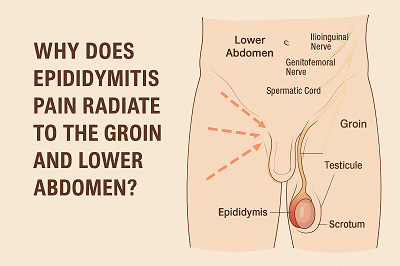Why Does Epididymitis Pain Radiate to the Groin and Lower Abdomen?
For many men who develop epididymitis—a painful inflammation of the epididymis—the discomfort doesn't stay confined to the scrotum. Instead, it often spreads upward, radiating toward the groin and even the lower abdomen. This confusing symptom can be alarming, especially if the pain is persistent or sharp. But why does this happen? And what does it mean?
Let's break it down in a way that's easy to understand, and most importantly, help you know what to do about it.

What Is Epididymitis, Exactly?
The epididymis is a tightly coiled tube located at the back of the testicle. It plays a key role in storing and transporting sperm. When it becomes inflamed—usually due to a bacterial infection—it can swell and become extremely tender. This condition is called epididymitis.
It may come on gradually or suddenly, and common symptoms include:
- Pain or swelling in one testicle
- Redness or warmth in the scrotum
- Pain during urination or ejaculation
- A heavy feeling in the testicle area
- Fever or chills in some cases
But one of the more puzzling symptoms is pain that doesn't stay local—it travels.
The Nerve Connection: Why the Pain Spreads
Pain from epididymitis often extends into the groin, lower abdomen, or even the inner thigh. This happens because of how the nerves in that area are wired.
The testicles and epididymis are connected to the body through a complex network of nerves and blood vessels known as the spermatic cord. These nerves don’t work in isolation. They share pathways with nerves that supply sensation to the groin and abdominal wall—particularly the ilioinguinal, genitofemoral, and iliohypogastric nerves.
In simpler terms: when the epididymis is inflamed, the brain may interpret the pain as coming from other regions connected by the same nerve pathways. That’s why it’s common to feel discomfort beyond the scrotum.
Inflammation Causes Local Pressure and Tension
Infection and inflammation also trigger swelling in surrounding tissues. As the body sends more blood to fight infection, tissues may become congested and tight. This increased pressure in the inguinal canal (the passage through which the spermatic cord travels) can aggravate nearby muscles and nerves, leading to cramping sensations or aches in the lower abdomen.
In more severe cases, men might mistake it for a pulled muscle or even a hernia.
Could It Be Something Else?
While groin and lower abdominal pain can be caused by epididymitis, similar symptoms can be seen in:
- Inguinal hernia
- Testicular torsion (a medical emergency)
- Prostatitis
- Kidney stones
This is why it is crucial to get an accurate diagnosis from a healthcare provider. An ultrasound or urine test may be needed to confirm the cause.
How Long Does the Pain Last?
If treated early—especially with proper antibiotics and supportive care—the pain usually begins to improve within a few days. However, full recovery can take a couple of weeks, especially if the inflammation has spread beyond the scrotum.
Some men also benefit from TCM (Traditional Chinese Medicine) options, especially when epididymitis becomes chronic or relapses frequently. Herbal formulas such as Diuretic and Anti-inflammatory Pill have shown promise in improving blood circulation, reducing inflammation, and addressing the root cause rather than just symptoms.
Learn more about how the Diuretic and Anti-inflammatory Pill treat epididymitis here.
Self-Care Tips to Manage the Pain
Here's what you can do to support recovery and relieve discomfort:
- Wear supportive underwear: A snug pair of briefs can help lift the testicles and reduce strain.
- Apply cold packs: Ice (wrapped in a towel) can reduce swelling and numb pain.
- Rest and limit activity: Avoid heavy lifting, prolonged standing, or sexual activity until symptoms subside.
- Stay hydrated: Drinking water helps flush bacteria from the urinary tract.
- Avoid alcohol and spicy foods: These may worsen inflammation and slow recovery.
Final Thoughts
Epididymitis is more than just a local infection—it affects a network of interconnected tissues and nerves. That’s why the pain doesn't always stay put. Groin and lower abdominal pain may feel overwhelming, but with timely treatment and proper care, most men recover fully.
If you’re experiencing symptoms that linger or worsen, don't wait. Chronic inflammation can lead to long-term complications. Seek medical advice and consider integrated treatment options like herbal medicine, especially if conventional antibiotics haven't brought lasting relief.



